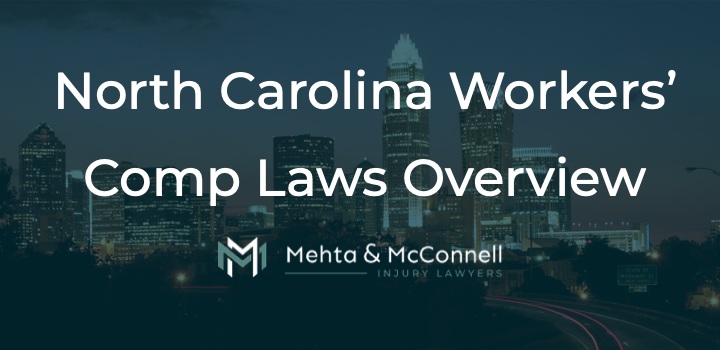
The Workers’ Compensation Act governs workers’ compensation claims in North Carolina. The North Carolina Industrial Commission administers workers’ compensation claims.
The Workers’ Compensation Act gives the Industrial Commission the authority to enact rules that must be followed in claims.
An experienced North Carolina workers’ compensation attorney will ensure your claim complies with this complex set of laws and rules.
Please don’t hesitate to contact us online or call our firm at (980) 326-2270 today for a free, no-obligation consultation.
How Does Workers’ Compensation Work in NC?
Workers’ compensation is “compromise legislation.” An injured worker can receive workers’ compensation benefits even if their mistake contributed to their accident.
In exchange, the injured worker cannot sue their employer in civil court and seek certain damages such as pain and suffering. The injured worker can usually only recover damages for their lost wages and payment for their medical treatment related to their injury.
Disputes in workers’ compensation claims usually arise over the wage loss benefits and medical treatment an injured worker is entitled to receive. You may feel you are not receiving the treatment necessary to recover from your injury. Or, you may not be receiving payment for your lost wages. A workers’ compensation attorney can pursue your claim before the Industrial Commission.
Statute of Limitations for Workers’ Compensation in NC
The statute of limitations on workers’ comp claims is two years.
You should report your injury to your employer as soon as possible.
Verbal notice is generally acceptable, but it is preferable to report the injury in writing. In fact, the Workers’ Compensation Act requires you to provide a written report of your injury within 30 days unless you can satisfy one of the exceptions to this requirement.
Providing your employer notice of your injury does not meet you have filed a workers’ compensation claim. Under NC workers’ compensation laws, you have two years from the date of your injury to formally file a claim. You must file your claim on an Industrial Commission Form 18.
This form must be carefully completed as it contains your description of the events that caused your injury. The Form 18 you file with the Industrial Commission may be later used by the Defendants to attack your credibility.
If there are any disputes in your workers’ comp claim, either party can file a Form 33 to request a hearing.
There is no statute of limitations for filing a hearing request as long as you have timely filed a workers’ compensation claim.
Coverage for NC Workers’ Compensation Insurance
Just like you buy auto or home insurance, your employer must purchase workers’ compensation insurance unless they are a very small business. Your employer’s workers’ compensation insurance company will likely be responsible for paying for your benefits. When you file a workers’ compensation claim in North Carolina, you are filing a claim against both your employer and its insurance company.
Some large employers are self-insured. This means they are directly responsible for your benefits, at least up to a certain amount. Even these large employers often have a third-party administrator, such as Sedgwick or Gallagher-Bassett, which handles their workers’ compensation claims on a day-to-day basis.
The insurance company or third-party administrator will assign your case to a claim representative, commonly known as an adjuster. The insurance adjuster is the person responsible for issuing the benefits owed to you and administering your claim.
Workers’ Compensation Benefits
There are two primary types of workers’ compensation benefits available.
The first is wage loss benefits, also known as disability benefits. If your injury causes a loss in your capacity to earn wages, then you have a claim for disability benefits. You are entitled to receive 2/3 of your pre-injury average weekly wage if you experience a total loss of earning capacity.
If you are still able to earn wages after your injury but at a lower amount, you are entitled to receive 2/3 of the difference between your pre-injury and post-injury average weekly wage if you can prove your injury is the cause of your lost wages. Disability benefits are generally tax-free.
The second primary workers’ compensation benefit is medical treatment. Your employer and its insurance company are responsible for providing medical treatment reasonably necessary to effect a cure, provide relief, or lessen the period of your disability.
Medical treatment in workers’ compensation claims often includes treatment with an orthopedist, physical therapy, prescription medication, and surgery. There are also lesser-known types of medical treatment such as attendant care and vocational rehabilitation benefits.
Both of the attorneys at Mehta & McConnell are board-certified specialists in North Carolina workers’ compensation law. With over 30 years of combined experience, we will ensure you receive all the medical and disability benefits you are entitled to under the law.
Frequently Asked Questions
We understand you never expected you would be injured at your job, and you certainly never thought you would need to hire a workers’ compensation lawyer. We hope the questions below and the content on our website will answer your questions and ease your mind about your claim.
How do I pay my workers’ compensation attorney?
We know most people cannot pay legal expenses out of pocket. The good news is you will not pay us out of your pocket. Our fee for our representation is 25% of any monetary benefits we are able to recover in your workers’ compensation claim. We don’t get paid unless you do.
What if I was injured while driving for work?
If you are driving to and from work, you likely do not have a valid workers’ compensation claim. The “coming and going” rule bars workers’ compensation claim for injuries sustained while a worker drives to and from their job unless the trip meets on of the exceptions to the rule. You may still have a personal injury claim against the at-fault driver.
If you were driving for a work-related task and you were hit by an at-fault driver, then you have both a workers’ compensation and a personal injury claim. The workers’ compensation carrier will have a lien against any recovery in your personal injury claim unless the lien is negotiated or waived.
We handle both personal injury and workers’ compensation matters. We will work to ensure you receive maximum recoveries from both claims.
What happens to my job after an injury?
Your employer is not required to keep your job open after your injury, but its insurance company owes you disability benefits if your injury causes you to lose wages. In some cases, your employer may want you to voluntarily resign from your job as part of any settlement of your claim.
While this is a common request in workers’ compensation claims, it is important to have an experienced attorney evaluate whether it makes sense in your claim.
Contact a Charlotte, North Carolina Workers’ Compensation Lawyer
As you can see, workers’ compensation claims in North Carolina are governed by a unique set of laws and rules. You don’t have to navigate the ins and outs of this complex system alone!
Let us help you along every step of the process. We are happy to have a free, no-obligation confidential consultation with you about your workers’ compensation claim. Contact us or call (980) 326-2270 to schedule a time to chat!

